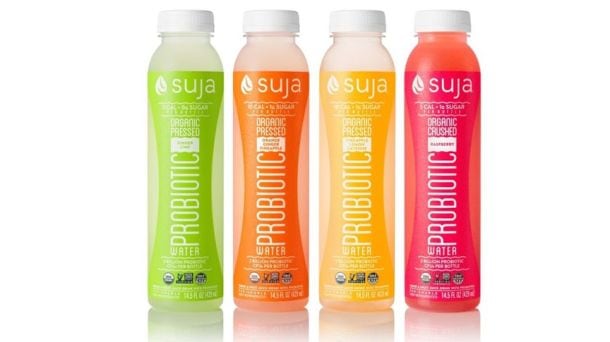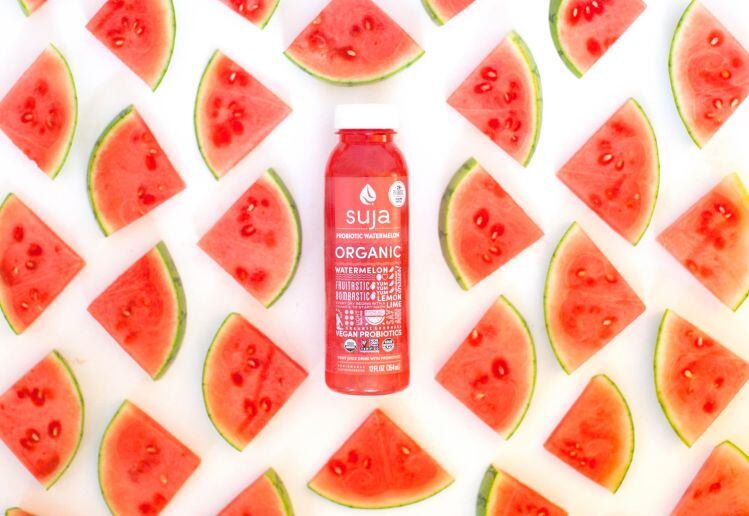Speaking to FoodNavigator-USA after unveiling a new digital ad campaign dubbed ‘Drink Plants,’ Rose said: “It’s early days, but our kombucha is off to a great start. We’ve got great feedback from buyers and consumers, although from a design perspective it is very similar to our juices, and we think it needs a little bit more separation, so we’ve tweaked the label to better separate the two lines, so people know which ones are juice, which ones are kombucha.”
From a formulation perspective, Suja’s line occupies a distinct position in the burgeoning kombucha category, as it utilizes a traditional, lengthy fermentation process with tea, cane sugar and a SCOBY (symbiotic colony of bacteria and yeast), but also contains some of Suja’s signature cold pressed juices; on-trend adaptogenic ingredients such as reishi, moringa and ashwaganda; and the probiotic bacteria lactobacillus rhamnosus, said Rose.
“The kombucha category is growing very fast and a lot of retailers are allocating more space to it. Some position in next to juice and as it’s growing faster, it’s getting more space at the expense of juice, while others are putting it in a separate set or refrigerator, which I think makes sense.
“Over the last year, Suja has gained distribution in kombucha and ultra premium juice [where it competes with brands such as BluePrint and Evolution Fresh], whereas some of the super premium juices are losing some distribution.”
Pressed probiotic waters have not met expectations

Suja’s pressed probiotic waters – which feature water, fruit purees and the Ganeden’s BC30 probiotic (Bacillus coagulans GBI-30, 6086) - got off to a strong start in 2016, but “have not met our expectations,” said Rose, who joined Suja in June 2017 after spending five years in senior marketing roles at General Mills.
“The value proposition might not have been there as it was $2.99 but only 1-2% juice, but also it was a new category and that can require education and investment and we didn’t have a huge marketing effort behind it, so we’re largely replacing it with more productive SKUs in juices and kombucha.”
Drinking vinegars undergoing packaging renovation
As for the drinking vinegars (which were launched in late 2016 and combine water, apple cider vinegar or coconut vinegar, cold-pressed juice, BC30 probiotic and stevia) the challenge is more around messaging and positioning, as feedback about the products themselves has been positive, said Rose.

“It’s done well in pockets; there are certain retailers where it’s done really well and others where it has struggled.
“We think the name scared some people off. It’s tough as the word ‘vinegar’ is intimidating for some consumers, so we’ve renamed and repositioned the product as ‘probiotic apple cider vinegar juice’ or ‘probiotic coconut vinegar juice,’ so that people see that there is juice in there and know that from a taste perspective it is not as harsh, that it won’t taste like Bragg [apple cider vinegar brand].”
The word ‘probiotic’ also gets top billing on the new packaging to draw consumers in, he added.
New 'Drink Plants' ads designed to broaden the audience
Suja’s high pressure processed core juice portfolio, meanwhile, continues to generate strong growth in the ultra-premium juice category (eg. brands such as Suja, BluePrint, Evolution Fresh), which is still growing in the double digits, although growth in super premium juice (eg. brands such as Odwalla and Bolthouse Farms) has tailed off, he said.
“We’ve had explosive growth, and we’re very well known in the natural foods world, but our overall brand awareness is still relatively low. Our brand has been in fewer than 5% of households over the last year, and depending on what tracker you use, less than a third of the population is aware of Suja.
“But we have a very strong repeat rate, so if we can drive more trial, there’s a ton of upside for the brand, so that’s going to be a big focus for us in 2018: increasing household penetration.”
The quirky new ‘Drink Plants’ digital ad, which features people expressing their love for plants and will be followed up with field marketing campaigns (billboards and living plant walls), is a brand awareness exercise designed to bring Suja to a wider audience and tap into enthusiasm for all things ‘plant-based,’ he added.
“We wanted to introduce or in some cases re-introduce, Suja to a wider audience.”
Juice category trends: Lower sugar, more functional ingredients, fermented botanicals
As for category trends, lower sugar is a continuing trend, said Rose, who noted that many recent launches had been more ‘hydration-based’ such as Suja’s lemon love SKU, which has zero grams of sugar per serving, while higher sugar SKUs were not performing as well.
“Generally greens are selling better than the higher sugar fruit SKUs in this category.”

Functional ingredients such as probiotics, and adaptogens such as ashwaganda, are also trending in the category, he said, although the lackluster performance of the pressed probiotic waters demonstrated that not everything with probiotics turns to CPG gold, and that the core proposition has to be make sense.
“Fermented botanicals [Suja’s Radiate juice features fermented lemongrass, Invigorate contains fermented ginger, and Gleaming contains fermented turmeric] are something we’ve come out with recently as well.”
The Coca-Cola effect?
So how are Suja team members feeling as they enter 2018, the year in which minority stakeholder Coca-Cola will decide if it wants to acquire the company (three years after it took its initial stake)?
“They’ve been involved in our business for two and a half years, and that relationship is already established, and they have been a great partner for us, so I don’t think there is a lot of apprehension, or a feeling that [if Coca-Cola were to acquire the business in its entirety] everyone would move to Atlanta [where Coke is based] and join the giant mother ship.
“The model that they have created so far is that they want to be a resource and help nurture the brand without overwhelming it with process.”
What is the Suja brand about?
So what is the Suja brand about? Initially it was about democratizing organic juice, but longer term it could potentially explore into other plant-based food and beverage categories, he said.
“We don’t want to move too quickly and lose our focus on the core, but we see Suja as a brand that could extend into other categories, and we’re exploring what those could be."
How is Suja’s kombucha made?

While some brands seeking a ‘raw’ positioning choose not to stop fermentation, this can result in unpredictable levels of sugar and alcohol in the product on shelf, says Suja, which adds a ‘kill step’ to stop the fermentation “so we can be transparent and accurate in disclosing the sugar and alcohol content to our consumers.”
However it’s “important to note that this does not also kill the kombucha’s benefits,” says the company, which puts its kombucha through a filtration process to remove the SCOBY and then holds it at a “low level heat – about half the temperature and half the time that’s used in ultra-high temp processing (UHT).”
Read more HERE.
